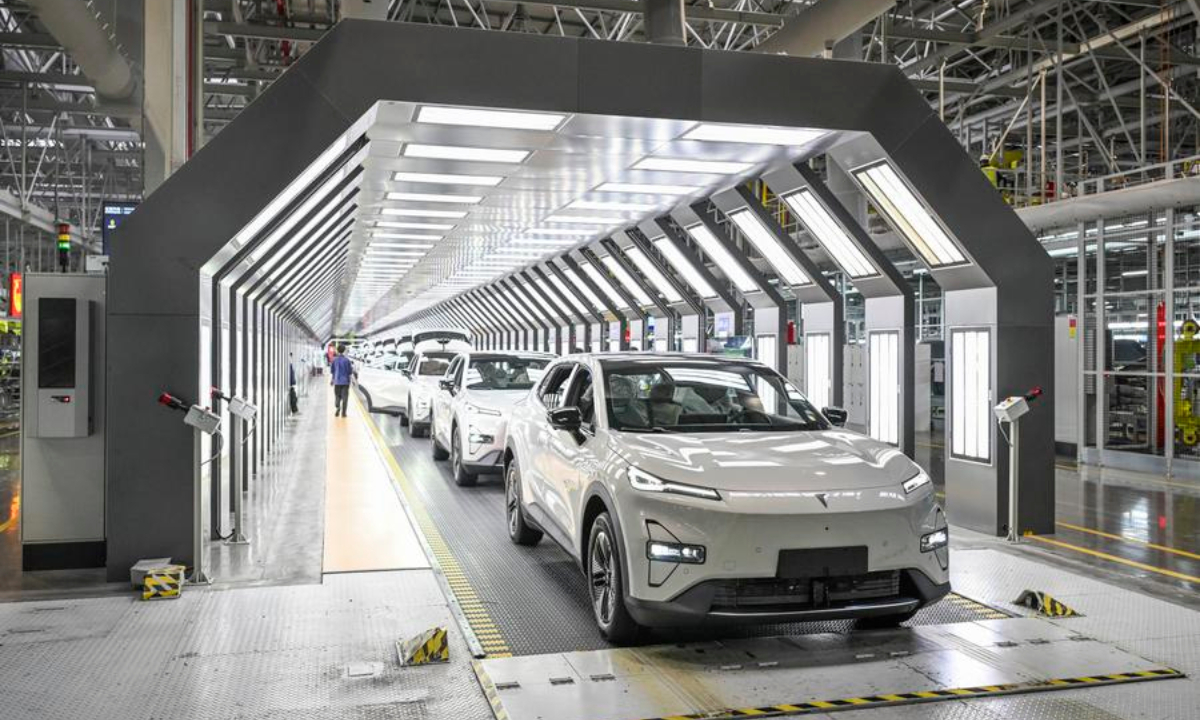
New energy vehicles are pictured at a smart factory of Changan Auto in Chongqing, southwest China, Jan. 9, 2025. (Xinhua/Wang Quanchao)
US President Donald Trump said on Monday that he might temporarily exempt the auto industry from previously imposed tariffs to give carmakers time to adjust their supply chains, the Associated Press (AP) reported. A Chinese expert said on Tuesday that the change in tone reflects the challenges the US car industry faces amid rising costs brought by car tariffs, while Washington's erratic tariff policies will intensify the chaos and uncertainty of US trade and economy.
"I'm looking at something to help some of the car companies with it," Trump told reporters gathered in the Oval Office. He said automakers needed time to relocate production from Canada, Mexico and other places, AP reported.
The change in tone might come as domestic players have voiced out challenges they faced amid the massive tariffs implemented, as US auto firms are facing increasing costs, He Weiwen, a senior fellow at the Center for China and Globalization, told the Global Times on Tuesday.
The US' auto tariff policies have forced auto companies to adjust their approach to the US market, and resulted in the stock decline of corresponding local companies in the sector, Zhang Xiang, director of the Digital Automotive International Cooperation Research Center of the World Digital Economy Forum, told the Global Times on Tuesday.
The US' 25 percent automotive import tariffs took effect on April 3, causing shock waves across the industry since supplies come from all over the world, Reuters reported.
Because US automakers source many of their car parts from key trade partners, including Canada, Mexico and China, a fully American-made car doesn't exist, according to experts, CBS News reported.
Meanwhile, research reports from Wall Street and automotive analysts said that they expected to see a drop in vehicle sales in the millions, higher new and used vehicle prices, and increased costs of more than $100 billion for the industry, according to CNBC.
Each country plays a role in global supply and production chains. If the US government prevents domestic automakers from working with global suppliers via tariffs, US industrial players will face rising purchasing costs in auto parts and the growing prices will eventually pass down to the consumers, Zhang said.
The discussion on pausing tariffs in the auto sector is not the first time recently that Trump has announced to tweak the tariff policy.
He pledged earlier that he will still apply tariffs to phones, computers and popular consumer electronics, downplaying a weekend exemption as a procedural step in his overall push to remake US trade. The late Friday reprieve - exempting a range of popular electronics from 125 percent tariffs on China and a 10 percent flat rate around the globe - is temporary and a part of the longstanding plan to apply a different, specific levy to the sector, the Bloomberg reported.
The erratic policy shifts meanwhile would intensify the chaos and uncertainty of US trade and economy, and bring US trade partners with even more uncertainties amid negotiations, He Weiwen said. He added that the swing came as the tariffs are established on an opportunistic approach rather than through research as the US has to change the measures when facing difficulties in implementation.
The US administration's flexibility has fueled a sense of uncertainty and confusion about the intentions and end goals. For instance, the S&P 500 stock index was up 0.8 percent Monday, but it's still down nearly 8 percent this year, per the AP report.
Carl Tannenbaum, chief economist for the Northern Trust global financial firm was quoted in the AP report that "Damage to consumer, business, and market confidence may already be irreversible."




